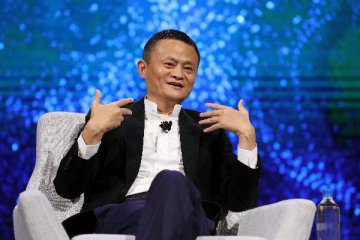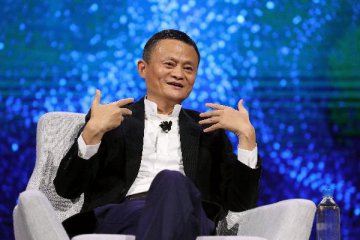
One of the most distinctive faces in China’s corporate world, Alibaba’s Jack Ma, is taking a bow. His apparent departure may not disrupt operations at the $421 billion company he co-founded 19 years ago. But it still may not be an auspicious sign.
E-commerce giant Alibaba announced Monday, Mr. Ma’s 54th birthday, that he would step down as its executive chairman next year. Investors are clearly jittery about the news: Alibaba’s New York-listed shares were down 1.8% in premarket trading Monday.
In a way, Mr. Ma’s retirement won’t change much. His successor, Chief Executive Officer Daniel Zhang, is an 11-year Alibaba veteran who has been pivotal to its success. He is credited with establishing Singles’ Day, an online shopping bonanza similar to Black Friday, that generated sales of $25 billion on Nov. 11 last year. Mr. Zhang and other experienced managers, including Executive Vice Chairman Joseph Tsai, have been taking care of Alibaba’s day-to-day operations since Mr. Ma stepped down as CEO in 2013.
The problem at Alibaba isn’t so much Mr. Ma leaving, but more whether such a thing is really possible. Mr. Ma is Alibaba’s third-largest shareholder, with a 6.4% stake, and is a lifetime member of the Alibaba Partnership, a 36-member conclave that effectively controls the company. Mr. Ma also controls the voting rights at Ant Financial, the company that runs China’s most popular online-payments system. Even without a formal role, Mr. Ma will have huge potential to influence Alibaba, raising questions about where accountability at the company truly lies.
A broader reason to fret concerns what Mr. Ma’s formal departure says about the growth prospects for a privately owned giant like Alibaba in China right now, as the government reasserts its control over the economy and promotes the interests of state-owned enterprises. The sheer size and omnipresence in daily life of the country’s most successful tech companies—all privately owned like Alibaba, Tencent and Baidu —means they risk conflict with Beijing. Regulators have put limits on Ant this year, for example, partly because the company’s success in attracting customer funds encroaches on state-owned banks’ turf.
Mr. Ma has sold 26.6 million shares of Alibaba, worth around $4.3 billion at current prices, over the past two years, for “ordinary wealth planning purposes and to meet philanthropic commitments,” according to a filing with the Securities and Exchange Commission. Investors might find the fact that he has been selling down his stake as instructive about the company’s future as the fact that he is retiring.
Source: The Wall Street Journal





















Latest comments